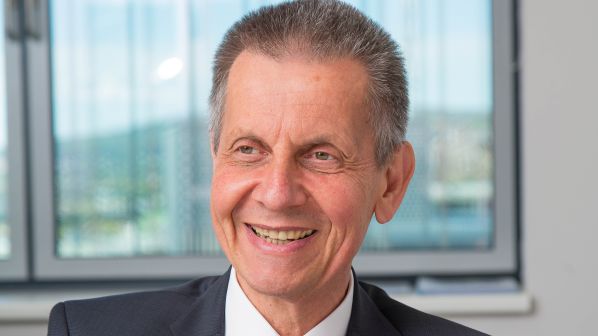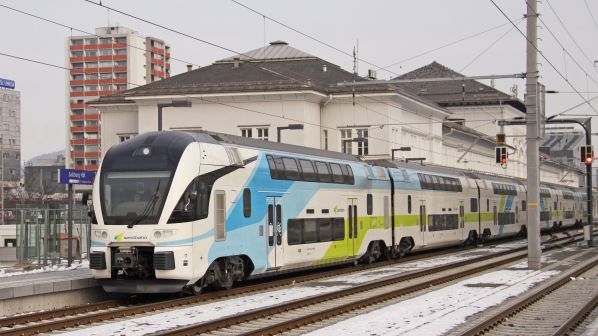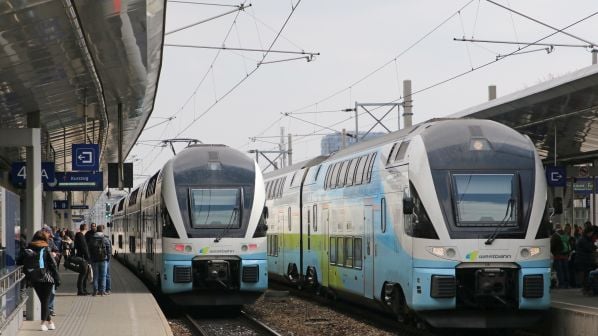2019 was a year of contrasts for Austrian open-access operator Westbahn. While the company carried more passengers than ever before - 6.6 million compared with around 6.1 million in 2018 - the operator made the surprising decision in the middle of the year to part ways with its 17 trains in two stages, answering German Rail’s (DB) call for a second-hand double-deck EMU fleet.
DB unveiled the first of the converted and upgraded Stadler Kiss four-car sets at Berlin Main Station last month. The railway plans to deploy nine of the 200km/h trains on Rostock - Berlin - Dresden services in March. The remaining eight six-car sets will transfer to DB at the end of 2021.
The impact on Westbahn is a significant reduction in the level of its Vienna - Salzburg service. The company abandoned the Blue Line service from Vienna Main Station at the December 2019 timetable change, ending the half-hourly Vienna - Salzburg service which it had offered since December 2017. Instead Westbahn is only operating the Green Line Vienna West Station - Salzburg service, offering 17 Vienna - Salzburg and 18 Salzburg - Vienna trains per day. The trains retain the 2h 26m journey time, running at hourly intervals throughout the day and a half-hourly frequency during the peak. In addition, to maximise peak time occupancy, Westbahn is running a shuttle service from Vienna - Linz at 20.42, ready for the first service of the day back to Vienna at 06.04.
“Each train will run around 515,000km per year, which is tremendously high. We are exercising intensive use of our fleet, which is not so typical in Europe.”
Dr Erich Forster, CEO Westbahn
Dr Erich Forster, Westbahn’s CEO, says that as a result of selling the fleet, the operator has decreased its production by 40% compared with 2019. However, he only expects this to translate into a 20% decrease in total passenger numbers due to the level of service that will remain available. He says Westbahn’s customers are loyal and appreciative of the price and punctuality of the service.

Forster adds that eliminating services from Vienna Central Station and focusing on Vienna West was logical because of the time it takes to cross the city. “It is a transition phase,” Forster says. “If you look at our timetable, although we have gone from having 17 to eight trains, we will still produce around 4.1 million train-km. Each train will run around 515,000km per year, which is tremendously high. We are exercising intensive use of our fleet, which is not so typical in Europe.”
In comparison, competitor Austrian Federal Railways’ (ÖBB) Railjet trains clock up 395,000km per year on the Vienna - Salzburg route according to booked diagrams. ÖBB Railjets operate a total of 7.89 million train-km per year on the route.
As well as steadily increasing passenger ridership on its own service, Westbahn’s bottom line has been enhanced in recent years through partnerships with other railways. It is operating the Austrian leg of RegioJet’s Vienna - Prague service, which will be extended to Budapest in June, and has a similar agreement with Meridian, a subsidiary of Bavarian Overland Railway (Bob), to operate the Austrian leg of the thrice-daily Vienna - Munich service, which commenced in April 2019. Westbahn’s service connects with Meridian’s in Salzburg. The two companies also cooperate commercially, selling tickets for each other’s services.
However, Westbahn is not planning to remain at the reduced level of operation on its own services for long. The operator confirmed its intentions in October by awarding Stadler a €300m contract to supply and maintain a new fleet of 15 six-car Stadler Kiss 3 double-deck EMUs. The order is financed by Austrian Train Finance, part of PCS Holding, a company owned by Stadler chairman Mr Peter Spuhler. Austrian Train Finance will lease the trains to Westbahn and delivery of the first set will begin in March 2021 and conclude by the end of that year.
While CRRC was in the running for the contract, Forster, who would not comment on other bidders, says that ultimately the speed of delivery of certified trains was the determining factor in proceeding with Stadler.
In addition, as an entirely six-car fleet, which with 526 seats are identical to the single six-car Kiss 2 train which entered service in 2017, the fleet will provide 10% more seats than previously. Forster says this will help the operator to expand its production to 7 million annual passengers or “even more” when they enter operation.
“2009 was really not an easy year, especially for a newcomer, due to the economic crisis in Europe.”
Dr Erich Forster
Whether Westbahn will achieve this figure by returning to operate half-hourly Vienna - Salzburg services is yet to be determined. Indeed, Forster indicated that Westbahn could look to operate some international services instead.
But with its trains seemingly performing well, why replace the fleet now and risk the progress that has been made?
“We bought our first trains [seven six-car Kiss 1 sets] in 2009 and our second series [nine four-car and one six-car Kiss 2 set] in 2014,” Forster says. “2009 was really not an easy year, especially for a newcomer, due to the economic crisis in Europe. In general, the financing conditions were really not in favour of our company. This was both how long we could finance the trains and also the general conditions because we had to have credit insurance to get reasonable conditions from the bank.
“Swiss Export Risk Insurance (Serv), the credit insurance for procurement in Switzerland, is really not cheap. As long as you have to work with Serv you have a lot of additional costs. We also found that if we did not proceed with Serv, the conditions for repaying the premium are not in favour of the customer. This was a really critical situation. To change such financing conditions is more or less impossible. So selling the fleet and buying a new one opens a completely new opportunity and changes the story very much.”
The financial shackles of these deals had partly contributed to Westbahn’s accumulated loss of around €83m by the middle of 2019, as revealed by co-founder, Mr Peter Haselsteiner during a press conference last July.
As a small private operator just starting out, it is understandable that banks would be wary of taking what might be perceived as a significant risk with financing a fleet of trains. However, Forster says this is one area where companies like Westbahn are penalised in comparison with their state-owned competitors which, with the backing of the state, are able to access entirely different financing terms and sources.
“It is very easy for them to go to the European Investment Bank (EIB), like ÖBB does,” Forster says. “This must be changed if we are to have an open field, where we have a completely identical situation for both state-owned and private companies.”
Closed door
Since launching its first service in 2011, the Westbahn story has been one of pushing against a closed door - whether this was securing service visibility on information screens and combating a sharp reduction in ÖBB’s fares in the early days of operation or inclusion in the incumbent’s ticket distribution channels, a problem that persists today.
The operator has also consistently argued that track access charges in Austria are too high. Westbahn received some good news in this particular fight in July 2019 when the European Court of Justice ruled that station access could not be charged separately from the “minimum access package” under which Westbahn operates. This was followed in November by a ruling by Austria’s Federal Administrative Court that Austrian rail regulator Schienen-Control must revise its approval of ÖBB Infrastructure’s track access charge for 2011-2017.
According to Austrian and European legislation, the charges for the minimum access package should not exceed the marginal costs of running a train. However, Austria’s infrastructure manger ÖBB Infrastructure included some fixed infrastructure costs necessary to maintain a line even if no trains run. Estimates of what the repayments may total vary from several hundred million euros to €1.5bn. And while the majority of these funds will be returned to ÖBB and Rail Cargo Austria, Westbahn could receive a refund as high as €50m, although Forster says recuperating any refund is set to be a long, drawn out process.
The Austrian government’s unwillingness to open the public service obligation (PSO) market to tender and the continuation of direct award contracts to ÖBB is another area of contention for Westbahn.

Photo: Keith Fender
Westbahn argues that restrictions on its ability to expand organically in the Austrian market is at the taxpayer’s expense. For example, Westbahn says it could operate contracts for long-distance, regional and local services in the east of the country, awarded on a PSO in December 2018, for a saving of €3bn. It has again taken its case to the Administrative Court. However, Forster says this again is a slow process which produces only limited results.
“Without the Fourth Railway Package we would have had a stop line for direct awards in 2019. It is now the end of 2023.”
Dr Erich Forster
“We can only argue that we had no chance to go into production, so we lost Ebit X, Y and so on, and claim for compensation,” Forster says. “That is the only chance we have and it is not easy. Looking at how successful tendering is, it must be logical that for each government, only tendering is the future.”
In Europe, Westbahn’s voice is enhanced by the Alliance of New Railway Entrants (AllRail), which since forming in April 2017, has lobbied in Brussels in the interest of its 12 European members. Forster says AllRail is doing a good job of acting as a collective voice and communicating with the public and the commission the challenges facing what are on the whole relatively small companies with limited resources.
Yet these challenges are significant.
Westbahn came out with a strongly worded statement against proposed reforms to European passenger’s rights in December. The company stated that compromises reached by the European Council were “lazy” and would favour state incumbent railways and not passengers by, for example, not making certain rail regulations mandatory, meaning frequent travellers could be excluded from receiving compensation.
Even legislation intended to encourage competition has actually hindered the timely introduction of tendering for PSO contracts, according to Forster. “The Fourth Railway Package was actually a step back because of the final decision taken,” Forster says. “Without the Fourth Railway Package we would have had a stop line for direct awards in 2019. It is now the end of 2023, which is a major problem for the newcomers.”
But with a new commission taking office at the end of 2019, and president Ms Ursula von der Leyen touting a Green Deal for the continent, the tide, according to Forster, might be about to turn for the private rail operators.
Forster argues that Europe’s Green Deal, which the commission hopes can deliver a green and sustainable European economy and will require shifting road traffic to more sustainable modes, will demand that more private entities and private capital enter the European rail market.
Changing political climate
“It is very clear that with the Green Deal, we need to change the situation,” Forster says. “We need a concept that attracts private investors and which secures them in the long-term, so they are not operating with the risk that access charges might increase immediately or suffer from a price war with their competitors, intended to halt the competition. The Green Deal is the big chance to change the situation into a more open field for newcomers and to bring the rail sector forward.”
Forster is similarly encouraged by the changing political climate in Austria.
The formation of a new governing coalition of the New Peoples’ Party (ÖVP) and the Greens on January 7 following protracted negotiations since the election on September 29 ended the ÖVP-Freedom Party coalition. Forster says the previous government’s approach through past ministers for transport, Mr Norbert Hofer (December 2017-May 2019) and Mr Andreas Reichardt (June 2019 - January 2020) resulted in a series of direct award contracts. “All with high subsidies, which cannot be changed,” Forster says. “This means the market is automatically closed until 2029.”
However, with the Green Party’s Ms Leonore Gesweller appointed minister in the new Ministry of Climate Action, Environment, Energy, Mobility, Innovation and Technology, Forster’s hope is that the case for more private entrants might finally get through.
“The government is still very new,” Forster says. “But we plan to have meetings in the near future where we will try to show everyone how productive we are, and how perfect for the market we are.
“It is not possible to prognose what will happen, it is still too soon.
But what we have seen is that the programme of the new government is perfect; it clearly states there must be a masterplan and a clear investment plan for the long-term. There needs to be new offers with financing from the state to attract people to use the train with network cards and so on as well as a very cheap basis for financing. We think that the future will be much better for the railway and that is essential otherwise the Green Deal will fail.”
Getting more people onto trains should not be the result of regulation, but a consensual decision. To achieve this, the quality of service must be high and the journey reliable. For Forster, and Europe’s other private passenger operators which are acting as a check on the state incumbents, their contribution is crucial to achieve an improvement in rail’s quality and reach.
While Forster admits progress has been slow and indeed little has changed in recent times, he is optimistic that the Green Deal will trigger a new attitude to the private companies’ efforts to disrupt the established order. Westbahn might currently be in transition, but the operator is intent on coming back, and coming back stronger.

